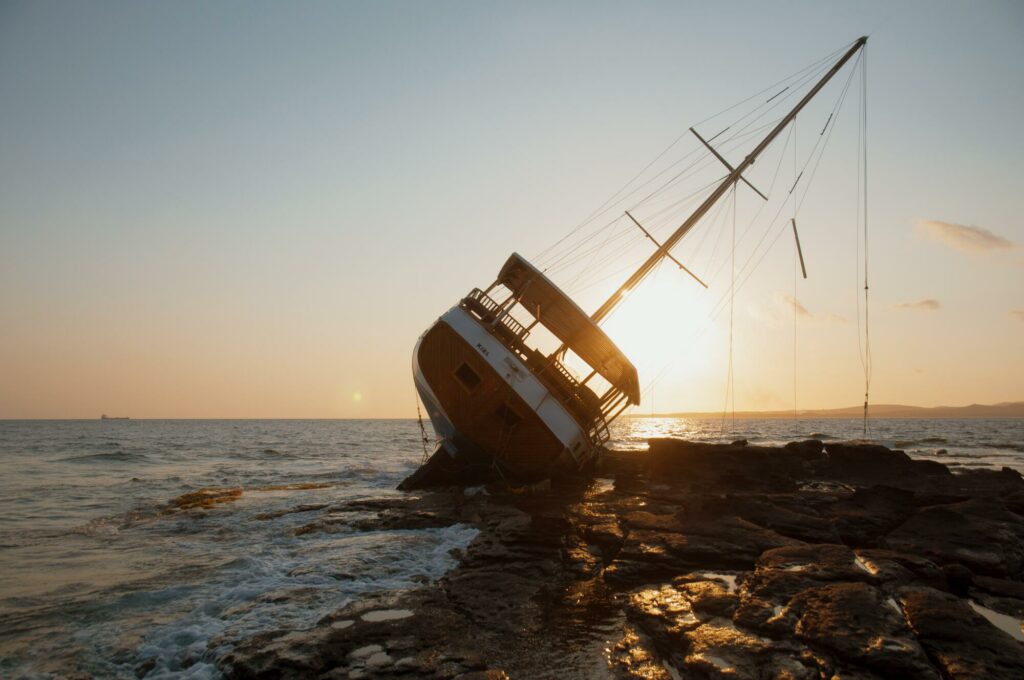No matter how comfortable or proficient you might be on the water, the reality is that accidents can happen. Every time you get into your boat, there’s a risk that it could sink.
From an operator error to an adverse weather event, there are many issues you could encounter. Your boat could even sink when you’re not even on it!
Boat insurance gives you peace of mind as you navigate on your vessel, but will it protect you in every instance? Does boat insurance cover sinking? Today, we’re taking a closer look at that question and sharing what experienced and novice boaters alike need to know.
Understanding Your Boat Insurance Coverage
In most cases, your boat insurance should kick in if your vessel sinks. However, to avoid paying an epic bill, it’s important to make sure you have the right coverage in place.
In addition to comprehensive or full boat insurance, you should also have a special type of policy called sinking coverage.
Many boaters mistakenly believe that their liability coverage is enough to help cover the bill in the event your boat sinks. However, this is incorrect. A basic boat liability policy may cover a portion of the damage, such as costs associated with recovering and removing the vessel, but it will not cover the actual cost of the sinking.
Why is this the case? Put simply, liability boat insurance is designed to protect you from incurring all the costs if you accidentally damage someone else’s boat. It’s not meant to cover costs directly related to your own boat.
Let’s check out the boat insurance you do need, and how it will apply after a sinking.
Comprehensive Boat Insurance
Full or comprehensive boat insurance will deliver a payout if your boat sinks due to any type of peril, also known as catastrophic damage. In most cases, perilous events are defined as events outside of your control.
This means if you fail to properly maintain your boat and it sinks as a result, then your comprehensive coverage won’t apply. The boat insurance company will likely say that the accident is on you because your negligence caused it to occur.
Common examples of peril include:
- Theft
- Fire
- Vandalism
- Weather events
If you have a full boat insurance policy in place and your boat sinks due to any of the above issues, you should be covered. In addition, your policy may also cover some of the costs associated with removing and salvaging your boat.
Note that if your policy has built-in coverage for salvage, removal, or wreckage costs, this could lower your overall payout. Some insurers will subtract those costs from the value of your boat, meaning your total reimbursement isn’t as high. Or, they might write you a check for the value of your boat but require that you spend a certain portion of the payment on salvaging your vessel and removing the wreckage.
Be sure to read your policy completely before signing any type of agreement. You want to make sure you’re comfortable with the terms and the risks you could incur.
Common Comprehensive Policy Exclusions
Before you invest in a boat insurance policy, it’s important to read the fine print.
Many policies have what’s known as a distance or navigation limit in place. This means that if you take your boat outside of a certain radius, then your coverage won’t apply. For instance, you may only be able to navigate your boat 300 miles offshore before you’re in the no-coverage zone.
Others may impose limits on certain locations or types of weather events that are included in your coverage. For example, if you take your boat into a dangerous area during hurricane season and it sinks, the insurance company may not cover it.
It’s also important to know the type of use that your policy covers. Most are only designed to cover personal use, which means you could be left footing the bill if your boat sinks while you’re using it for a commercial purpose, such as a chartered fishing trip.
Total/Guaranteed Replacement Cost Coverage
Do you have a brand-new boat or a vessel that’s at least younger than two years old? If so, you might qualify for total replacement cost coverage. Also called guaranteed replacement cost coverage, this policy is typically very expensive, but it could be your best bet in some situations.
With this kind of coverage, your insurer will buy you a brand-new boat to replace your old one in the event of a covered loss. If the sinking is linked to an approved peril, this means you could get a boat that’s the same make and model, allowing you to recover from the loss more quickly.
The caveat is that this policy won’t apply to boats older than two years or so. Once they reach that timeline, your actual cash value or agreed-upon value policy will apply, which we’ll discuss below.
How Will Your Coverage Apply?
If your boat sinks and you’ve determined that insurance will help cover it, you might wonder what to expect next. Will you be reimbursed for the full amount?
The answer depends on how you set up your coverage. When you first sign up for a boat insurance policy, you can state the value of your boat that you want the policy to cover. If your boat suffers a total loss (as is the case with most sinking), then your insurer will cover the stated value of your boat.
In general, there are two ways to insure your boat. They include:
- Actual cash value
- Agreed-upon value
Here’s how the two policies differ.
Actual Cash Value
For most boaters, actual cash value is the most economical way to insure their boat. In this case, the amount of coverage is based on the boat’s fair market price at the time of purchase.
Over time, this value will gradually decrease as the boat experiences normal wear and tear. Boats tend to depreciate as they get older. While each insurance company will have its own formula for calculating depreciation, you can assume that the older your boat is, the less reimbursement you’ll receive because it’s gone down in value over time.
Agreed-Upon Value
Unlike actual cash value, a policy based on agreed-upon value does not factor in depreciation. Also called hull value, this coverage is based on an amount determined by you and your insurance provider at the time you sign up for the policy. Usually, the value will be at least what you paid for the boat.
If your boat sinks, the insurer will reimburse you for the amount you both agreed upon at the beginning. You’ll receive this amount regardless of how old the boat is when it sinks. While this type of policy is common, it usually comes with a higher premium than an actual cash value policy.
Does Boat Insurance Cover Sinking Due to a Rock?
Hitting a rock is one of the most common causes of a sinking boat. Will your boat insurance coverage help you pay for the damage if your vessel strikes one and sinks?
If you were operating your boat safely and properly, then your comprehensive coverage should apply if you hit a rock. However, your insurer could deny coverage if you were responsible for the collision in any way. Actions that could put the responsibility on your shoulders include:
- Driving the boat too fast
- Driving the boat while distracted
- Driving while intoxicated
The insurance company could consider these conditions to be negligence, which would mean they’re not responsible for helping to cover the damages.
When to Call Your Insurance Company
If your boat sinks with people on board, the first thing to do is make sure everyone is safe. Then, you should call your insurance company as quickly as possible.
If possible, take pictures and videos of the damage soon after the sinking occurs. This can help the claims process go more smoothly. You may also need to meet in person with your adjuster to discuss the events that led to the disaster.
The insurer will examine your evidence and listen to your account of the sinking. Then, they’ll use this information to determine if your boat is salvageable or a total loss. If it costs more to repair the vessel than it’s worth, they’ll consider it a total loss.
From there, they’ll determine your total payout based on the coverage you chose for your boat (e.g. actual cash value, agreed-upon value, total replacement coverage).
Find Boat Insurance You Can Trust
Your boat should be a source of enjoyment and pride. You should feel confident taking it out on the water and enjoying it with your loved ones, and a boat insurance policy can give you that assurance.
Does boat insurance cover sinking? In most cases, the answer is yes, but your insurer can tell you if any exclusions apply to your coverage.
Whether you’ve been boating for years or this is your first vessel, our team at HH Insurance is here to protect your investment. We can provide boat/marine insurance for all kinds of watercraft, from ski boats and fishing boats to pontoons, sailboats, and even Jet Skis.
To learn more and request a quote, complete our online form today!
**This blog provides a brief overview of the terms and phrases used within the insurance industry. These definitions are not applicable in all states or for all insurance and financial products. This is not an insurance contract. Other terms, conditions and exclusions apply. Please read your official policy for full details about coverage. These definitions do not alter or modify the terms of any insurance contract.

